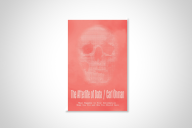You have /5 articles left.
Sign up for a free account or log in.
The folklore of Indonesia and Thailand tells of a frog who is born under half of a coconut-shell bowl and lives out his life there. In time, he draws the only sensible conclusion: the inside of the shell is the whole universe.
“The moral judgment in the image,” writes Benedict Anderson in Life Beyond Boundaries: A Memoir (Verso), “is that the frog is narrow-minded, provincial, stay-at-home, and self-satisfied for no good reason. For my part, I stayed nowhere long enough to settle down in one place, unlike the proverbial frog.”
Anderson, a professor emeritus of international studies, government and Asia studies at Cornell University, wrote major studies of the history and culture of Southeast Asia. A certain degree of cosmopolitanism went with the fieldwork. But the boundaries within a society can be patrolled just as insistently as its geographical borders -- and in the case of academic specialties, the guards inspecting passports tend to be quite unapologetically suspicious.
In that regard, Anderson was an even more remarkable citizen of the world, for his death late last year has been felt as a loss in several areas of the humanities as well as at least a couple of the social sciences. Nearly all of this reflects what someone writing in a scholarly journal once dubbed “Benedict Anderson’s pregnant phrase” -- i.e., the main title of his 1983 work Imagined Communities: Reflections on the Origin and Spread of Nationalism, which treated the mass production of books and periodicals in vernacular languages (what he called “print capitalism”) as a catalytic factor in creating a shared sense of identity and, with it, the desire for national sovereignty.
By the 1990s, people were pursuing tangents from Anderson’s argument with ever more tenuous connection to nationalism -- and still less to the specific emphasis on print capitalism. Any group formed and energized by some form of mass communication might be treated as an imaginary community. Here one might do a search for “Benedict Anderson” and ”World of Warcraft” to see why the author came to think of his best-known title as “a pair of words from which the vampires of banality have by now sucked almost all the blood.” Even so, Imagined Communities has shown remarkable longevity, and its landmark status is clearly international: it had been translated into more than 30 languages as of 2009, when it appeared in a Thai edition.
The reader of Life Beyond Boundaries soon understands why Anderson eventually developed mixed feelings about his “pregnant phrase” and its spawn. His sense of scholarship, and of life itself, was that it ought to be a mode of open-ended exploration, of using what you’ve learned to figure out what you could learn. Establishing a widely known line of thought must have become frustrating once it’s assumed to represent the only direction in which you can move. Professional interest is not the only kind of interest; what it recognizes as knowledge is no measure of the world outside the shell.
Anderson wrote the memoir by request: a Japanese colleague asked for it as a resource to show students something of the conduct of scholarship abroad and to challenge the “needlessly timid” ethos fostered by Japanese professors’ “patriarchal attitude.” Long retired -- and evidently reassured by the thought that few of his American colleagues would ever see the book -- Anderson was wry and spot-on in recounting the unfamiliar and not always agreeable experience of American academic life as he found it after emigrating to the United States from England as a graduate student in the late 1950s. For one thing, his professors looked askance at his papers, where he might indulge in a sardonic remark if so inspired, or pursue a digressive point in his footnotes.
“In a friendly way,” he writes, “my teachers warned me to stop writing like this …. It was really hard for me to accept this advice, as in previous schools I had always been told that, in writing, ‘dullness’ was the thing to be avoided at all cost.” He also underscores the paradox that the pragmatic American disinterest in “grand theory” coexisted with an academic hunger for it, renewed on a seasonal basis:
“‘Theory,’ mirroring the style of late capitalism, has obsolescence built into it, in the manner of high-end commodities. In year X students had to read and more or less revere Theory Y while sharpening their teeth on passé Theory W. Not too many years later, they were told to sharpen their teeth on passé Theory Y, admire Theory Z, and forget about Theory W.”
Lest anyone assume this refers to the situation in the humanities, it’s worth clarifying that one example he gives is the “modernization theory” that once ruled the social sciences roost. And similar ridings of the trend wave also prevail in the choice of areas for research. The antidote, he found, came from leaving the academic coconut bowl to explore Indonesia, the Philippines and Thailand:
“I began to realize something fundamental about fieldwork: that it is useless to concentrate exclusively on one’s ‘research project.’ One has to be endlessly curious about everything, sharpen one’s eyes and ears, and take notes about anything …. The experience of strangeness makes all your senses much more sensitive than normal, and your attachment to comparison grows deeper. This is also why fieldwork is so useful when you return home. You will have developed habits of observation and comparison that encourage or force you to start noticing that your own culture is just as strange ….”
Unfortunately the author does not say how his intended Japanese public responded to Life Beyond Boundaries. A lot probably depends on how well the moments of humor and reverie translated. But in English they read wonderfully, and the book is a gem.








